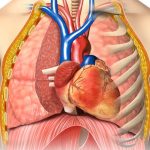What we choose to eat can have direct effects on how we age and cognitive decline. A large study recently found that people who consume the Mediterranean Diet are more likely to preserve the length of the telomeres on their DNA. Preserved telomere length is a reliable indicator of cell health and age and has become a fundamental focus of anti-aging clinics across this country. The Mediterranean Diet itself is complex and composed of a variety of different nutrients such as wine, olive oil, whole grain, fish, poultry, fruits, and vegetables. Which nutrients precisely may be responsible for this correlation is unknown at this point. What we do know is that anti-oxidants in foods are strongly related to telomere length. So it may be the resveratrol in the red wine, the Vitamin E or phenols in the olive oil, the omega 3 oils in the fish, or the carotene and Vitamin C content of the vegetables which are responsible for preserving the telomere length. It may a combination of them all and this process may begin as early as adolescence.
Sugar-sweetened beverages (SSBs), including soft drinks/sodas, fruit-flavored drinks, sports drinks, and energy drinks, are the largest source of added sugar in the American diet. Between 1999 and 2008, it was estimated that adults aged 20–34 years consumed an average of 333–421 calories/day, and adults aged 35 years or older consumed an average of 236–260 calories/day from SSBs. Because of these strikingly high levels of consumption, SSBs have emerged as an important target of public health efforts and policies.
In parallel to trends in SSB intake, the prevalences of obesity and type 2 diabetes have also increased in recent years. Epidemiologic studies have shown that regular consumption of SSBs is associated with increased risks of obesity, metabolic syndrome, type 2 diabetes and cardiovascular disease. However, the mechanisms for these associations are complex and not yet fully understood. There is evidence to suggest that excess calories (via lowered satiety) and high levels of insulin resistance, oxidative stress, and inflammation, may mediate these associations. Given that oxidative stress, inflammation and insulin resistance are also associated with telomere shortening, impaired telomere length maintenance is a potential mechanism that may help to explain the association between SSB consumption and accelerated metabolic disease.
Telomeres are the DNA-protein caps at the end of chromosomes that promote chromosomal stability and protect the genomic DNA from damage. Telomere length naturally shortens with each cell cycle and, if it falls to a critical short length, the cell is no longer able to divide and often malfunctions. In addition to biological age, telomere shortness has been linked to lifestyle behaviors and psychological stress. In turn, shorter telomeres have been associated with increased risks of chronic diseases, including cardiovascular disease, diabetes and some cancers. In population studies, evidence exists for a causal role of impaired telomere maintenance in raising risks of pulmonary and cardiovascular disease. To date, the associations between dietary intake and telomere length have been examined in only a few studies; results for most food groups and nutrients have been mixed.
Given the effects of SSBs on oxidative stress and insulin resistance, scientists examined the associations between sugar-sweetened beverage, diet soda, and 100% fruit juice consumption and telomere length in a large, nationally representative sample of healthy adolescence and young adults. They found that beverages with high sugar content would be the most detrimental to cellular aging, such that sugar-sweetened sodas and non-carbonated SSBs would show the strongest associations with telomere shortness.
Another study in adolescence looked into telomere length and white bread consumption with interesting results. A positive correlation between dietary total antioxidant capacity and telomere length was found after adjustment for age and energy intake. However, higher white bread consumption was associated with shorter telomeres in fully-adjusted models. Interestingly, those individuals who had simultaneously higher dietary total antioxidant capacity and lower white bread consumption significantly presented the longest telomeres.
In a similar large study including participants from 40 countries researchers found that the same high quality diets which have been shown to be protective against the development of cardiovascular disease may also be protective for our aging brains and cognitive decline. The scientists used something called a Mini-Mental State Examination (MMSE) to determine the mental “sharpness” of the participants. People who consumed foods associated with higher levels of antioxidants and healthy fats, such as vegetables, fruits, and fish were associated with better scores on the MMSE over time. To the contrary, those who consumed less of these foods and more fried foods, red meats, and alcohol had lower scores on the MMSE over time. This second group of participants also had a higher incidence of “cardiac events.” The study did not explore which food or food element in the healthy diet contributed most to the reduced cognitive decline. And because it is an observational study, it cannot establish causation. The researchers did presume that it is likely that the beneficial association between diet, cardiac events, and cognitive decline is mediated through effects on risk factors such as blood pressure, glucose and inflammation.










